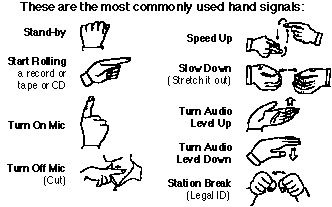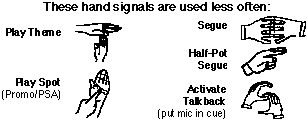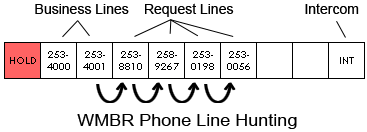
|
WMBR Membership Information Updated 9/3/2004
About This DocumentWMBR is an MIT student activity organized and operated for the benefit of the Institute and the MIT community. It is an educational FM broadcast radio station reaching beyond MIT to the greater Boston area.The following are the rules and procedures that all WMBR station members are expected to know and follow.
Interested MIT students or staff should contact the WMBR Membership Director
for details on joining WMBR. He or she can be reached at
1.0 On the Air1.1 FCC Rules1.11 Legal ID'sAs a federally licensed radio station, WMBR must identify itself with its call letters and city of location at least once an hour. WMBR's legal ID is "WMBR in Cambridge" or "WMBR - Cambridge." Nothing else may go in between those words. This ID must be said as close to the top of the hour as possible. The only exception is for classical and other music programs which air extremely long pieces.
1.12 AdvertisingWMBR is licensed as a non-commercial, educational (NCE) radio station. It is illegal for WMBR to "advertise" on the air. Advertising is defined as receiving compensation for promotion of goods or services. It is acceptable to promote events that may be of general interest to the listening audience. Concert reports are an example of this type of legal promotion. However, the following guidelines should be followed.
1.2 On-Air Style1.21 Technical ProficiencyLevels When you speak on the air, use a natural voice. It is okay to speak softly or loudly in certain circumstances, but the engineer must compensate for this by changing the level of the microphone. Try to speak at a constant audio level.Position Your mouth should be positioned about 4-6 inches from the microphone. If you are closer, you may induce a "prominence effect" which increase the bass response or "boominess" of the microphone. If you are too far away, the relative level of room ambiance will be too high and it will sound like you're speaking in a big empty room. Direction All of the microphones in WMBR's studios and control rooms are uni-directional, or "cardioid" microphones. This means that they pick up sounds better in the direction that they are facing. To take advantage of this, be sure the microphone is pointing directly at your mouth. It is not, however, necessary to have your mouth pointing directly at the microphone. Turning your head slightly to the side can help alleviate "popped P's" (see below) and other excessive breath noises. Popped P's Certain phonemes, especially the letter P, can cause excessive wind noise on the microphone. Popped P's can be lessened by altering your speaking habits. Practice saying words with P's in them while holding your hand 2 to 3 inches in front of your mouth until you cannot feel any wind on your hand.
1.22 JargonAs a radio announcer and/or engineer, you will learn many terms which are used in the broadcasting industry. The general listening audience, however, may not know what you are talking about. You should try to avoid these specific terms. There is always another term that you could use that will make you sound better to your listeners. Here are a few examples:
1.23 Personal StyleRelax, take your time, and enjoy yourself.Be yourself. Trying to make yourself sound slick usually sounds like someone trying to make themselves sound slick. Make a tape of yourself when you are on the air. Then listen to the tape critically sometime later. Specifically, listen to how many times you say things like, "umm...," "err...," "uh...," "you know...," "before that...," and "ya know what I'm sayin'...."
1.24 Hand SignalsIt is often necessary to communicate to someone at WMBR through a window without the use of speech. You should be familiar with the most commonly used hand signals:
 
1.3 WMBR OTA Policies1.31 Obscenity/Indecency1.311 Definitions: In public Notice 87-153, the Federal Communications Commission makes two definitions:Indecency - "language or material that depicts or describes, in terms patently offensive as measured by contemporary community standards for the broadcast medium, sexual or excretory activities or organs."All station members should be familiar with these definitions, upon which the rules stated below are based. 1.312 WMBR Obscenity/Indecency Policy: WMBR has a stated policy on Obscenity and Indecency which is contained in the WMBR Operating Plan. Please read this policy. In a nutshell it says that:
1.32 DisclaimersWMBR does not, as an entity, have a political viewpoint. This is the stated policy of the Technology Broadcasting Corporation, the organization that holds the license to WMBR's transmitter. WMBR does not have editorials.Although WMBR does not hold opinions, Station members and/or their guests may announce their opinions on the air, provided that they make it known that those opinions are theirs and theirs alone. To make this clear to the listeners, a "disclaimer" should be read whenever such opinions are aired: "The views and opinions presented on this program do not necessarily reflect those of the Staff and Management of WMBR, the Technology Broadcasting Corporation, or MIT."For radio programs with inherently controversial or political themes, it is a good idea to read the above disclaimer at the beginning and end of every show. 1.33 All Announcers Should be Station MembersA person is expected to become a WMBR station member before she or he may host a radio program on WMBR. This includes being a "substitute" announcer when the regular announcer cannot make it. This also includes announcing on programs with rotating hosts. In particular, this includes Nite Owl.If you do a radio show, it is acceptable for you to have a "guest" announcer on your program, provided that you are there with them. An example of this is when listeners pledge money to WMBR and receive the privilege of being a DJ for an hour. The Management of WMBR wants to meet and know every person who is doing a radio program on WMBR.
2.0 Around the Station2.1 Use of Equipment2.11 Practice ApprovalNo equipment in either of the control rooms is to be touched by any person who has not been certified as "practice approved" by an OTA Engineer.One must be a station member to be "practice approved."
2.12 Check with OTA EngineerNo one should touch any piece of equipment in either control room without first checking with the OTA Engineer. All persons must always follow the instructions of the OTA engineer while inside the station.
2.13 No Food or Drink in Control RoomsAny food or drink in the control rooms is grounds for immediate suspension.
2.14 No Smoking AnywhereSmoking anywhere in the station is grounds for immediate suspension. If you must smoke, please smoke outside the station.
2.2 The Phones2.21 WMBR Phone Basics
2.22 Which Lines are WhichWMBR's request line is 253-8810. This is the only number you should ever give out over the air.253-8810, 258-9627 and 253-0198 are the request lines. They are in a hunt group. These lines are for the announcer to pick up and no one else. WMBR's internal business number is 253-4001. Do not give this number out over the air, or to anyone who is not a station member. This number is for members to use to contact the station. This line has priority over the request lines, and should always be answered first by the engineer. If the engineer does not pick up, other members at the station should do so. WMBR's external business number is 253-4000. Do not give this number out over the air. This line is for non-members to contact WMBR on station business. You should not answer this line, as it is connected to a voicemail system.
2.23 HuntingWMBR's phones are set up to "hunt on busy" to the next appropriate available line. For example, if a caller dials in to 253-8810, but that line is busy, then the next request line, 258-9627, will ring instead. If 258-9627 is also busy, then 253-0198 will then ring instead. Below is a diagram showing which phone lines hunt to which:

2.24 Answering the PhoneSay "Hello, WMBR."Be courteous to all callers, no matter who they are or what they want. If they become offensive or are rude to you, and you no longer feel capable of being polite, politely hang up. If they are looking for someone at the station, put them on hold and page that person. If the person is not around, take a message, and leave it on the bulletin board under the person's last initial.
2.25 IntercomThe last button on the right of the phones is the Intercom. This line does not dial out, but it allows people within the station to talk to one another through the phones. By dialing the Intercom Code for a particular phone in the station, you can buzz a phone in another room, indicating to a person in that room that you wish to talk to them on Intercom. The Intercom Codes are posted on the phones. The Intercom line can also be used for paging.
2.26 PagerTo use the pager from either control room, press the blue "Page" button and speak into the microphone. If there is a phone call for someone, state the name of the person the phone call is for and which line it is on. Always repeat the message at least once.To page through the phone, press the Intercom button, lift up the handset, and press 0. After you have repeated the message, hang up the phone.
2.3 Answering the DoorIf you do not know the person at the door, ask them who they are and whether they are a station member. All non-station members must sign the ledger on the table near the front door.If they are not a station member, you are responsible for them. If they are here to meet someone, make sure that they do. If you cannot watch them, and there is no one else here, please ask them to wait outside the station.
2.4 The Book2.41 Read It"The Book" contains important information that you need to be aware of as a station member. You should read The Book every time you come to the station. If you have information you wish to share with the station at large, go ahead and write it in the book. Be sure to date and sign your notes. If the information is really only for one or two specific people, please leave them a note on the bulletin board instead. The Book is kept in the lounge, on a table in the corner opposite the front door. Please return it there after you read it.
2.42 Sign Your Initials in the FrontAll station members should be signed into the book. You may use initials when signing your notes, but please be sure to put your initials at the front of The Book along with your full name.
2.5 Staff ListAll station members should be listed in the Staff List. Station members' phone numbers, addresses and emails should never be given out to anyone who is not a station member.
2.6 Record Library2.61 Access to the Record LibraryOnly station members who actually have a need to get into the record library may be told the door code.Non-station members should never be given the code and must be escorted at all times in the record library.
2.62 How To File Records and CD'sWhen you pull a record or CD from the library, also pull an adjacent item part of the way out. This makes it much easier for you to find the correct spot when you refile your music.Music is arranged by format (LP's, CD's and 7-inch singles) and genre (pop, jazz, classical, etc.). Most genres are alphabetized by the name of the band, or by the last name of the solo artist. You may pull records for a radio show beforehand and leave them in a record/CD rack. If you do this, please leave them in plain sight, and please leave a note with them, saying who you are and when you will be playing them. Please do not pull records for a show more than one day in advance if possible.
2.63 How To Handle Records and CD'sNever touch the grooves of a record with your hands. Your hands secrete oils and acids that will destroy the vinyl over time. Only touch the very edges of the record, or the center label.Never touch either surface of a CD. Only touch the very outer edges of a CD, or use your finger in the center hole. Never set a CD down on any surface except in a CD player or in its proper case. Never write on a CD with anything except a soft felt-tip marker.
2.64 RL Listening StationWMBR Announcers may use the Record Library Listening Equipment (turntable, receiver, tape deck, CD player) without being practice approved. When finished listening to your music, leave the receiver tuned to WMBR 88.1 FM at a moderate audio level.
2.7 Operating PlanOther WMBR station policies and procedures are spelled out in the WMBR Operating Plan, which is publicly posted and available at the station. Included in the Operating Plan are job descriptions for the various management positions, programming policy, engineering policy, procedures for inducting new members, and other information, including such things as Obscenity/Indecency Policy and Sexual Harassment Policy.
2.7 ConstitutionAs an ASA-recognized MIT student organization, WMBR must have a written constitution. This constitution is publicly posted and available at the station. The Constitution outlines procedures for the election of the General Manager and general policy on Station Membership.
2.8 Management2.81 General ManagerThe only elected position at WMBR is the General Manager. The GM is responsible for everything that happens at WMBR. This position must be held by a current MIT student, as spelled out by the WMBR Constitution. All other positions are appointed by the General Manager.
2.82 Management BoardThe WMBR Management Board is appointed by the General Manager to assist in the management of the station. The specific powers of the Management Board are spelled out in the WMBR Operating Plan. The Management Board may or may not include persons holding any of the following positions.
2.83 Management PositionsCurrent management positions as well as their office hours are posted at the station. A complete description of each of these positions is included in the WMBR Operating Plan.
|